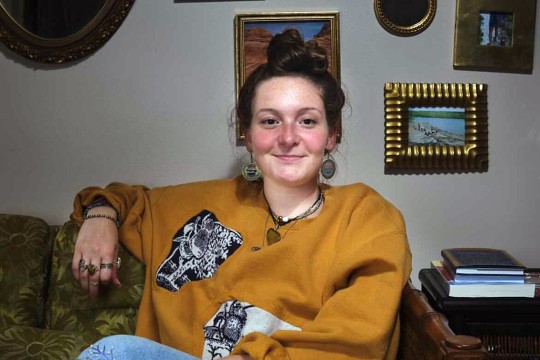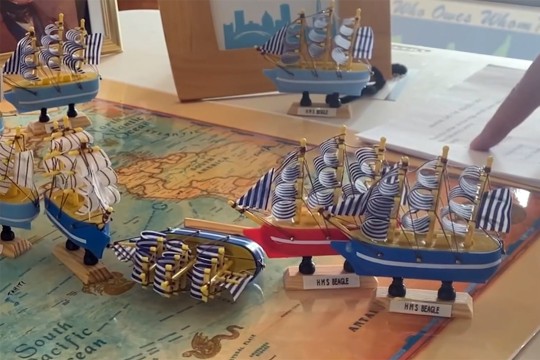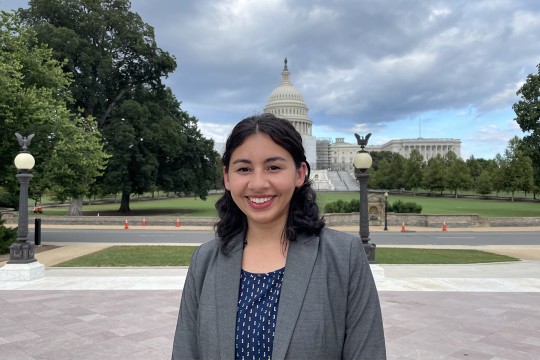News
Thomas H. Gosnell School of Life Sciences
-
May 10, 2023

First cohort of Performing Arts Scholars prepares for last act at RIT
Many of the RIT students who received the first Performing Arts Scholarships four years ago are preparing to take the stage one last time as they graduate this week.
-
May 8, 2023

Graduates find their niche with RIT’s School of Individualized Study
Thousands of RIT students are graduating this week with majors including engineering, computer science, cybersecurity, business, and fine arts. But more than 250 graduates are also receiving customized bachelor’s and master’s degrees from RIT’s School of Individualized Study, which allows students a flexible education pathway of their choosing.
-
May 5, 2023

RIT graduates seek careers in growing health care field
Elle Holland discovered her dream job as a genetic counselor while still in high school, and she came to RIT to become a scientist as the first step toward her career goal. She is one of several 2023 graduates finding careers in health care.
-
April 25, 2023

RIT graduate programs rank among best in nation in ‘U.S. News & World Report’ 2023 survey
RIT graduate degree programs are among the best in the nation, according to the U.S. News & World Report annual statistical survey of graduate programs.
-
April 24, 2023

André Hudson named dean of RIT’s College of Science
André Hudson has been named dean of the College of Science at RIT. Hudson is a prominent biochemistry and microbiology researcher who has served as interim dean of the science college since August of 2022.
-
April 12, 2023

Photo, science classes merge for climate change talk by Pulitzer-winning photojournalist
Salwan Georges of The Washington Post visited the RIT campus for a pair of lectures, including one that detailed his work photographing climate change for a project that received a Pulitzer Prize.
-
April 7, 2023

RIT and Seneca Park Zoo Society to host Great Lakes Plastic Cleanup event at the Port of Rochester
RIT and the Seneca Park Zoo Society will hold a special event at the Port of Rochester from 10 a.m. to noon on Saturday, April 15, to educate members of the public on how they can address plastic pollution and showcase some of the latest technology in the field.
-
March 8, 2023

Human genome editing offers tantalizing possibilities – but without clear guidelines, many ethical questions still remain
Essay by Andre Hudson, professor and interim dean of the College of Science, and Gary Skuse, professor in the Thomas H. Gosnell School of Life Sciences, published by The Conversation.
-
February 19, 2023

Darwin Day held in Rochester in celebration of science
Spectrum News talks to Robert Rothman, adjunct faculty member in the College of Science, about scientist Charles Darwin's explorations in the Galapagos.
-
December 10, 2022

RIT study suggests COVID-19 variants are still transmissible between mammals
Spectrum News talks to Gregory Babbitt, associate professor in the Thomas H. Gosnell School of Life Sciences, about his research into how the virus that causes COVID-19 is still highly transmissible between mammals.
-
December 5, 2022

RIT Interim Dean André Hudson named one of the ‘50 Most Important African-Americans in Technology’
Andre Hudson, interim dean of the College of Science, has been included in this year’s list of the “50 Most Important African-Americans in Technology.” The 22nd annual list will appear in the December 2022 issue of the Journal of Black Innovation.
-
December 2, 2022

RIT Grad Receives Prestigious Science and Technology Policy Fellowship
Since graduating from RIT, Dr. Nicole Arroyo has earned her Ph.D. in immunology and received a prestigious Science and Technology Policy Fellowship from AAAS.




